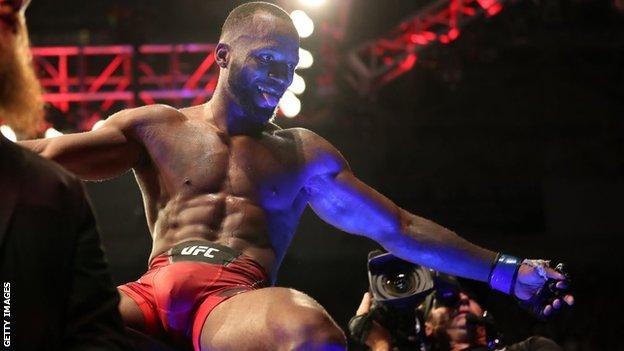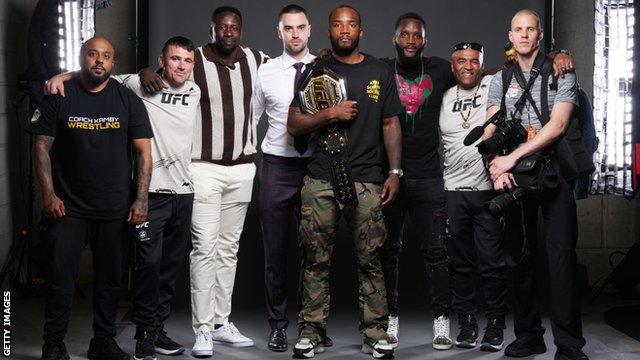Leon Edwards: Survival and belief key to real-life Rocky story
- Published

Leon Edwards was born in Jamaica before settling in Birmingham
Survival. And belief.
Leon Edwards' triumph in becoming a UFC world champion last weekend is about so much more than sport, so much more than the history-creating moment of being only the second British fighter to win a UFC title.
Michael Bisping reached the milestone at middleweight after his own deep struggles in 2016. Now there is 'Rocky' Edwards too.
For any champion in a fight sport, the story will always be about the struggle to get to the top, and the striving for excellence against rivals. Yet as Edwards' cage nickname 'Rocky' suggests, the narrative goes deeper with him. The path to his victory last weekend is one with survival written all along it.
Survival as a child. Survival through hardship in Kingston, Jamaica. Survival in a new country; survival from gang culture as a teenager; surviving years of injuries and even being overlooked as an also-ran with the UFC over a period when Edwards was arguably the number one pound-for-pound fighter in Europe. Somehow, through it all, Edwards never gave up.
Survival was there in the fight itself, late in the evening in Salt Lake City at UFC 278, watched by his family and gym team-mates at home in Birmingham.
He survived to the very end of a fight deep into the fifth round against an opponent in Kamaru Usman, who had beaten him before, and who was making his sixth defence of the 170lbs welterweight crown.
Edwards was the underdog - perhaps he has always been the underdog - but so perfectly did he take the chance to finish his opponent with a defining head kick when the moment presented itself. It was emphatic and - to those who saw it - unforgettable.
As Edwards walked away, his arms raised, to be embraced from behind by his brother Fabian, he celebrated a victory with a universal message.
His is a story of the triumph of a human spirit that would not be broken, a true tale of survival and belief.
That belief came from deep within Edwards. From days of hunger, days of desperation. Days of hardship and toil. Days that made him, but days that as a 31-year-old father, he will never wish or cannot even imagine for his offspring.
It is said that greatness is forced on some people. Hardship was forced on Edwards, and from it has come a salutary tale.
Allow Instagram content?
This article contains content provided by Instagram. We ask for your permission before anything is loaded, as they may be using cookies and other technologies. You may want to read Meta’s Instagram cookie policy, external and privacy policy, external before accepting. To view this content choose ‘accept and continue’.
In the contest with Usman, as the seconds ebbed away in the final round, Edwards searched for his moment.
In that fifth round, he was behind and about to be shut out of the fight. But he was never broken. He still believed. And then an act of focus brought a moment of triumph to be played out over and over again.
Let's put the meat on the bones of his story: Leon, and his brother Fabian - also an MMA fighter with Bellator - spent their early lives in a one-room wooden shack with a zinc roof in a poor part of Kingston, Jamaica, with their mother and father where "hearing gunshots was normal".
Imagine. They did not know they were living in privation. It was normal. They were happy, though, and well provided for by their parents.
The neighbourhood in Kingston was riddled with crime, drugs and warring between the gangs.
As young boys, just over 20 years ago, their father moved them to London, and then Birmingham.

Edwards' brother Fabian (third from the left) is also a fighter
There was organised crime there, too, and until they found MMA, and created Team Renegade, they had their time running with the gangs.
As Edwards told the BBC in a revealing interview last week: "I've been in situations where, I wouldn't say I feared for my life, but life-threatening situations. We did what all gangs do. Sell drugs, there were robberies, shootings and stabbings.
"I was arrested a few times, for fights and having a knife. My mum had to come to the police station many times to get me out.
"I knew what I was doing was breaking her heart, but I just kept doing it because your friends are doing it and as a teenager you're just involved."
Writer Ann Helen-Sund in an academic study of MMA - The Sport, The Club, The Body - saw the sport as "being as real as a fight gets" where a controlled fight in a cage has been uprooted from a street fight and elevated to a special plane where the fan suspends reality to watch heroes who make physical expression the voice of the tribes who follow them.
When those voices are laced with authenticity - like Edwards - those groups go to war with the fighter they have chosen, identifying deeply and closely with them.
We are wired for connection, as fight fans.
What Edwards accomplished will stay in the minds of the sport's fans forever, on the night the Jamaica-born British mixed martial artist painted a picture of his life in a fight never to be forgotten.